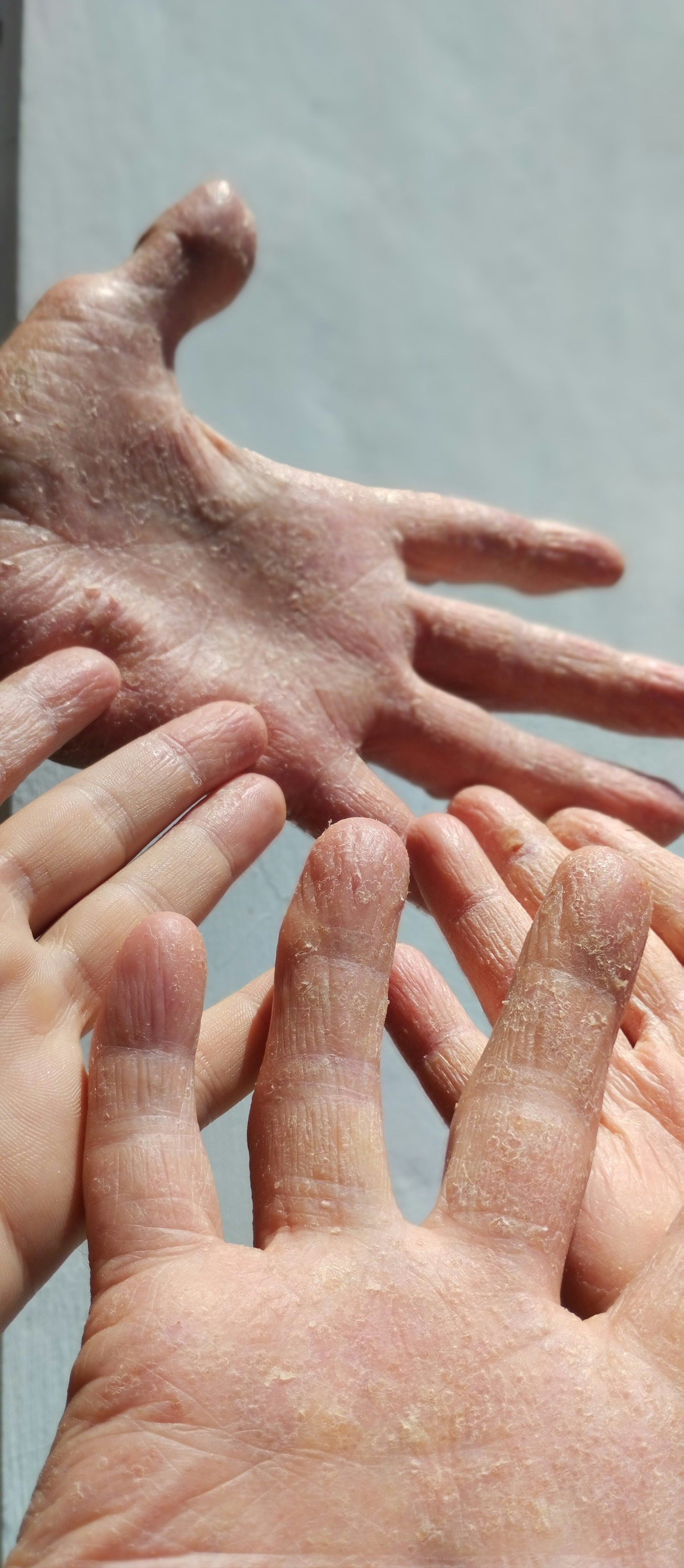Understanding Psoriasis: Identifying Symptoms and Maintaining Healthy Skin
What is Psoriasis?
Psoriasis is a chronic autoimmune skin condition that results in the rapid reproduction of skin cells, leading to the buildup of excess skin on the surface. This results in the formation of red, inflamed patches covered with silvery scales, a hallmark symptom of the disease. Psoriasis affects not only the skin but can also have a significant impact on an individual’s quality of life. The condition is known for its cycles, featuring flare-ups and periods of remission.
There are several distinct types of psoriasis, each characterized by unique symptoms and manifestations. The most common form, plaque psoriasis, is marked by raised, red patches covered with white or silvery scales. Guttate psoriasis typically appears as small, drop-shaped lesions and is often triggered by infections such as strep throat. Inverse psoriasis presents as smooth, red patches in skin folds, while pustular psoriasis is characterized by white pustules surrounded by red skin. The most severe type, erythrodermic psoriasis, affects large areas of the body and can be life-threatening, requiring immediate medical attention.
Numerous factors can contribute to the onset and exacerbation of psoriasis. Genetics play a significant role; individuals with a family history of the condition are at a higher risk. Environmental triggers include stress, skin injuries, infections, and certain medications. Lifestyle choices, such as smoking, excessive alcohol consumption, and obesity, can also exacerbate symptoms. Awareness of these triggers is crucial for managing psoriasis, as individuals can take preventive measures to minimize flare-ups. Understanding the complexities of psoriasis is essential for effective management and maintaining healthy skin.
Identifying Symptoms of Psoriasis
Psoriasis is a chronic skin condition characterized by various symptoms that can vary in severity among individuals. One of the most prominent and recognizable signs is the appearance of red patches of skin, which are often covered with thick, silvery scales. These patches may occur on various parts of the body, including the elbows, knees, scalp, and lower back. The scales result from an accelerated skin cell production cycle, leading to a buildup of skin cells that outpace the normal shedding process. The visibility of these patches is often a primary reason individuals seek medical attention.
In addition to the characteristic plaques, individuals with psoriasis may experience dry and cracked skin that can be severe enough to bleed. This symptom can exacerbate discomfort, as the cracks may become irritated or infected, further complicating the skin’s health. Itching or burning sensations are also common complaints, which can vary from mild to intense, greatly affecting the quality of life. In some cases, the itching may precede the visible symptoms or occur in areas where patches develop.
Nail involvement is another critical aspect of psoriasis; individuals may notice thickened, pitted, or ridged nails. Nail changes can occur in the form of discoloration or detachment from the nail bed, often leading to further discomfort and embarrassment. It is crucial to differentiate these symptoms from other skin conditions that may mimic psoriasis, such as eczema or seborrheic dermatitis. Therefore, if these signs manifest, consulting a healthcare professional is essential for proper diagnosis and management. Early recognition and accurate diagnosis can lead to effective treatment strategies, ultimately helping individuals manage their symptoms and maintain healthier skin.
Effective Management of Psoriasis
Managing psoriasis requires a multifaceted approach tailored to the individual, as the condition affects each person differently. One of the most common forms of treatment for psoriasis involves topical therapies. Corticosteroids are often prescribed to reduce inflammation and slow the rapid skin cell turnover that characterizes psoriasis. These treatments are available in various strengths and formulations, allowing patients to apply them directly to the affected areas. Vitamin D analogs are another effective topical option, working to inhibit skin cell growth and promote shedding of the scales associated with psoriasis. These medications can significantly improve skin appearance and comfort when used consistently.
For those whose psoriasis is more severe or resistant to topical treatments, healthcare professionals may recommend systemic medications. These drugs work throughout the body to manage symptoms more effectively. Methotrexate and cyclosporine are commonly prescribed systemic medications that help to suppress the immune system, thus reducing the severity of flares. Biologics are a newer category of treatment that target specific aspects of the immune system and have shown promising results in clinical studies. These medications need to be administered by a healthcare professional and require regular check-ups to monitor their effects.
In addition to medical treatments, incorporating lifestyle modifications can play a vital role in managing psoriasis. A well-balanced diet rich in omega-3 fatty acids, antioxidants, and anti-inflammatory foods can help reduce flare-ups. Furthermore, establishing a consistent skincare routine is essential for maintaining healthy skin. This includes the use of moisturizers to combat dryness and irritation often experienced by individuals with psoriasis. Stress management techniques, such as mindfulness and yoga, can also contribute significantly to alleviating symptoms, as stress is a known trigger for exacerbations. Together, these strategies form a comprehensive management plan that can help individuals with psoriasis achieve healthier skin and improved quality of life.
Living with Psoriasis: Tips for Healthy Skin
Living with psoriasis requires diligent attention to your skin care and overall well-being. It is essential to establish a daily skincare routine that prioritizes hydration. Individuals with psoriasis often experience dry, flaky skin, which can lead to discomfort and increased visibility of symptoms. To combat this, opt for moisturizers specifically formulated for sensitive skin. Products containing ingredients such as ceramides, hyaluronic acid, and glycerin can be particularly beneficial in locking in moisture and maintaining skin elasticity. Applying moisturizer shortly after bathing can help to seal in hydration effectively.
In addition to skincare products, clothing choices play a crucial role in protecting your skin. It is advisable to wear loose-fitting, breathable fabrics to avoid exacerbating irritation and discomfort. Natural fibers such as cotton are ideal, as they allow the skin to breathe while reducing the risk of overheating and sweating, which can trigger flare-ups. Furthermore, consider wearing layers to help manage temperature fluctuations throughout the day.
Sun protection is another vital aspect that should not be overlooked. While some sun exposure can be beneficial due to the vitamin D it provides, prolonged exposure can lead to sunburn, which may worsen psoriasis symptoms. It is recommended to use a broad-spectrum sunscreen with an SPF of at least 30, applying it generously to exposed skin and reapplying every two hours. For additional skin protection, wearing hats or clothing with UPF ratings can be effective.
Managing stress is equally important, as emotional well-being significantly affects the severity of psoriasis symptoms. Techniques such as mindfulness, yoga, or deep-breathing exercises can aid in reducing stress levels. Seeking support through communities or counseling can also provide emotional relief and help individuals feel less isolated in their journey with psoriasis. Engaging with others who share similar experiences can create a sense of understanding and solidarity, which is invaluable when managing a chronic skin condition.


